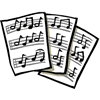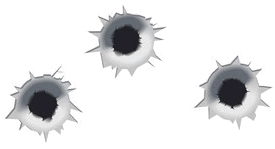Midwestern University, Wichita Falls, Texas 1963: My big plan was to become an engineer, because I thought a slide-rule would look good with my glasses. And so I was in the math class.
The professor was a large, languid fellow with an embarrassing habit of scratching himself absentmindedly, spreading chalk dust on his pants.
On this particular day, he was chalking a proof on the blackboard. “Let’s assume such-and-such,” he said, and then described five or six steps, “and then as you can see, the result is so-and-do.”
Except that something was wrong.
I’m no whiz at math, and had to struggle and focus. But it just didn’t look right. Something was wrong. The proof and the class ended at the same time, but I remained sitting, going over it.
To my left, Bill the ex-marine with crisp black hair still in a crew cut. To my right, Dennis with wavy long blonde hair. They were staring and pondering, too. All the other students had left the room. The professor looked at the three of us.
“A question?” he asked us.
“There’s just something …” began Bill.
“Something’s wrong,” I said.
“It’s this,” said Dennis. “If your original assumption is correct, then the proof is correct. But if not, then the conclusion is wrong. The proof is circular.”
The professor smiled a slow, warm smile. “Well, now,” he said. “That’s exactly correct. The real proof requires calculus, which I can’t use here. But without giving a proof, students just don’t understand it. So we use this one.”
Haw haw haw haw haw!
Over coffee, I met the boys. They were older. Bill had just finished his Marine stint; Dennis an army tour. Both had been in Japan. “Ohio,” they said when meeting; I think it means hello. “Gomenizai,” they would say, “I’m very sorry.” Haw haw haw haw haw!
Next semester we shared a drafting class. At that time, there was an adventure with a girl, she missed a period, and I was all uptight. They just laughed. “A woman is not a close-tolerance machine,” said Dennis.
Huh? I had no clue what he meant.
“He means,” Bill said, “that most likely you got nothing to worry about. Just relax.” They thought my expression funny. Haw haw haw haw haw!
I neither relaxed nor thought it funny, but they were right, as it turned out. After drafting class was lunch. Over burgers, Bill was talking about El Toro Marine Base, and about sky-diving. Really?
By the following week, Bill had found a place where we could go sky-diving. It cost $50. Dennis said he was in. I did, too. Bill handed me a piece of paper: a release. “Since you’re eighteen,” Bill said, “you need to get your parents to OK this.” I said OK.
In the evening, I handed the paper to my mother and stepfather. My mother didn’t know quite what it was, and my stepfather seemed uncertain. I explained that it was perfectly safe, and that you just jumped out of an airplane. It was really fun, like flying, and you had a parachute.
They looked at the paper. They looked at each other. They looked back at me.
Haw haw haw haw haw!



